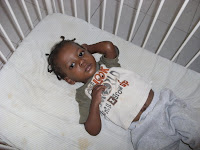At the time, orphaned and displaced children were taken into 'protective' custody in camps that these aid agencies set up for Internally Displaced Persons. The perceived threat to children who were orphaned or separated from their families? Orphanages. They were considered to be sites of potential child trafficking. It was frustrating to have an empty orphanage - all most all of the children in our care, who were in the adoption process at the time of the earthquake, were evacuated to their waiting families overseas. We had the capacity to provide excellent care to orphaned and displaced children, but we were not permitted to take them in.
Following one of my posts a reader, who was affiliated with one of the aid agencies commented anonymously. He or she told me that orphanages should not exist, since the best interests of children and families were served through approaches to the 'orphan problem' that targeted communities, not just children. Although this person was not brave enough to go 'on record', (s)he wanted me to know that orphanages such as ours were obstacles in the path of development agencies. Why? Apparently, we suck up donor funds that they need to realise their goals.
I don't believe that our donors would necessarily give to larger aid agencies if GLA did not exist. They are inspired to give to smaller charities, charities with hearts and souls.I believe that they care about individual children: faces, names, stories.
In may 2010, a BBC reporter asked a representative from a British-based aid agency,
that is opposed to international adoption, how she would answer grown up orphans like the GLA staff member, who said that international adoption would have been the better option for him. Better than 15 years of institutionalization in his home country. Her answer: this was a sad story, but it was just one story. Her agency had to view the bigger picture.
These were words that chilled me. They chilled me then, and for some reason, they are haunting me this week.

A week ago, two children were admitted to GLA. Julenord was the first to arrive. He cast a pitiful form in the nursery. A faded, ashen skinned, stringy-haired little boy, whimpering, and writhing in his crib. At almost two years old, his spindly legs were too weak to support his body weight. He has never learned to walk. He grieved the mother, who loved him, and he didn't understand, yet, the depth and perhaps the fierceness of this love. His Mother loved him so much, that she surrendered him. 'Do you understand, that if you make this decision,' our Haitian administrator counselled,'You are giving up your parental rights? Do you understand that if you sign this paper, one day Julenord will leave Haiti? Do you know that you may never see him again after that? Are you sure this is really what you want?'
'Yes.'
Melouse, a tiny, malnourished infant with Downs Syndrome,came next. Slowly starving to death since her birth, she was carried here by an aging Mother. A Mother who wept as she negotiated the rocky mountain road, with her precious bundle. Tears of sorrow, of regret, of resignation, and yet accepting this as the best option for her baby. She had tried.
It seems ridiculous to those of us who work at GLA, to even consider the scenario of closing our doors, and sacrificing Melouse and Julenord to 'the bigger picture.'
We hope that one day, there will be a viable social support network in Haiti, to support children and families like theirs. Then, birth families will not be forced to chose orphanages or adoptions versus selling their child into slavery, or raising them in extreme poverty.
Until then, we are standing in the gap, because if we did not, what would become of these children?
Pray for us, that we will continue to make the right decisions for each child that comes through our gate.









 This afternoon, our sickest baby is 9 month old Osmaika. She caught an intestinal infection two weeks ago, and has not recovered in the same way that our other babies have. This little girl was born prematurely and she came to us in December, at the age of two months, after contracting cholera and being abandoned by her birth mother.
This afternoon, our sickest baby is 9 month old Osmaika. She caught an intestinal infection two weeks ago, and has not recovered in the same way that our other babies have. This little girl was born prematurely and she came to us in December, at the age of two months, after contracting cholera and being abandoned by her birth mother.
